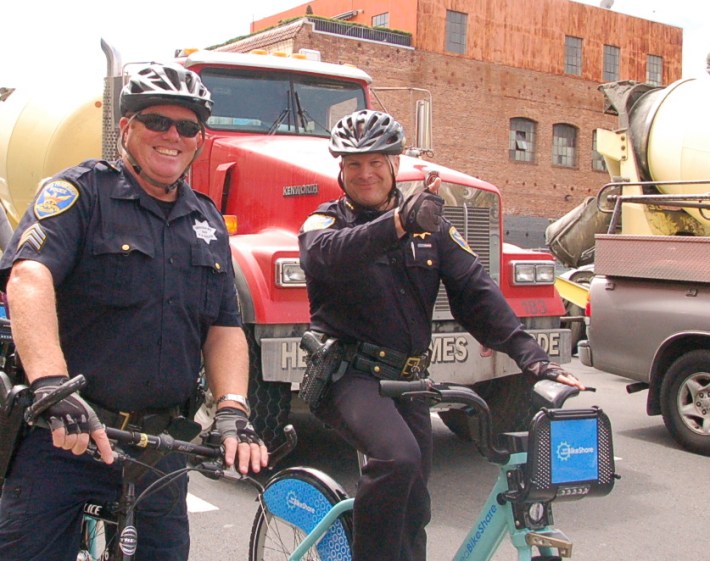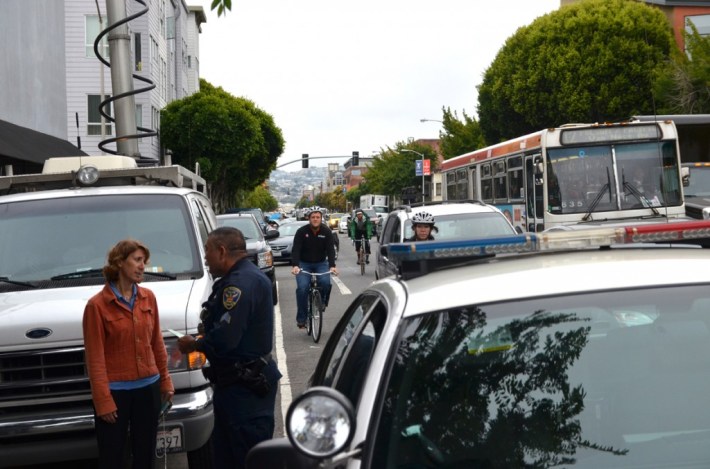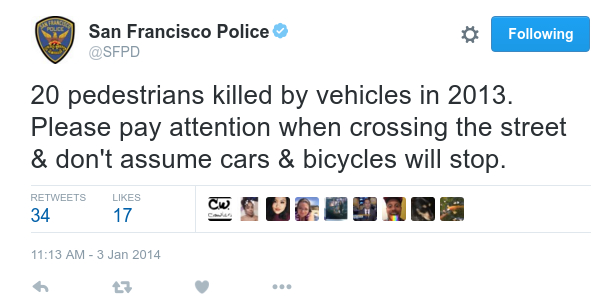Police Chief Resigns: What Does it Mean for Livable Streets?
5:18 PM PDT on May 20, 2016

As Streetsblog readers have surely heard, police Chief Greg Suhr was forced to resign Thursday after the shooting of an apparently unarmed woman by SFPD. The police shootings of Mario Woods in December and Luis Gongora in April both seemed to show a department where officers are failing to deescalate situations and are too quick to resort to deadly force. As the Chronicle explained:
Mayor Lee had stood by the chief he appointed in 2011 through two controversial police shootings within the past six months and revelations that a number of officers had exchanged racist and homophobic text messages. But at a late-afternoon news conference at City Hall, the mayor said that after Thursday’s shooting, he had “arrived at a different conclusion to the question of how best to move forward.”
It's a tricky thing, taking a safe-streets perspective on the resignation. Obviously, the shootings, the texts, and other incidents have contributed to a heightened distrust between the SFPD and communities of color. But it would be remiss not to point out the overlap between vulnerable road users, the disadvantaged, and the way they are treated by city agencies, including the police. It's no coincidence that the Tenderloin, in addition to all its other problems, is the district with the highest rate of pedestrian-versus-car injuries. And it is the last to get any bike lanes and safety measures. As Walk San Francisco's director Nicole Ferrara put it:
The recent actions by SFPD have been deeply troubling and we support rapid reforms to ensure that black and brown communities in San Francisco are treated with respect, dignity and equity. We have been working with SFPD to ensure that they are sharing data on crashes and citations, including racial data.
Chief Suhr supported Vision Zero, San Francisco's ambitious program to eliminate traffic deaths, publicly. But that didn't seem to bear out on the ground. As Streetsblog readers will recall, just last month a tipster sent us a photo of Suhr's car parked illegally in front of City Hall, blocking sight lines a few feet from where 68-year-old Priscila Moreto was mowed down by a motorist a few years before.
He was also at odds with bike community over the Bike Yield Law. Streetsblog readers will recall that the Bike Yield law, originally authored by Supervisor John Avalos, was an attempt to get the SFPD to stop focusing an inordinate amount of resources on citing cyclists for rolling through stop signs. But Suhr came out against it. “Stop signs are pretty simple. They say ‘stop,'” Suhr told KQED last year in an interview about the ordinance. “They don’t say ‘yield,’ they don’t say, ‘slow down.'” Suhr added that anyone who violates the letter of the stop sign law “will be cited." But since the law was about directing precious enforcement resources to the data-driven enforcement of deadliest violations, not changing the meaning of a stop sign, his arguments never made any sense.
In fact, he ran a department where, in practice, cops just don't seem to prioritize enforcing road safety laws, and, too often, feel entitled to violate them themselves. Streetsblog readers will also recall the bizarre example of San Francisco Police Sergeant Richard Ernst, who intentionally blocked a bike lane right in front of a legal parking spot, to victim-blame Amelie Le Moullac. Le Moullac was run over and killed by a big rig on Folsom which, video evidence showed, was making an illegal right turn. But Ernst felt it was his duty to break the law to tell SFBC Executive Director Leah Shahum, in the middle of a remembrance event, that cyclists who get right hooked by trucks are somehow at fault for their own deaths.

Suhr later apologized for Ernst's behavior. But, as Streetsblog readers will recall from past reporting, the victim-blaming continued, as with this tweet from the SFPD following a spate of pedestrian fatalities in 2014:
It would be unfair to pin every fault of the SFPD on Suhr. And when it came to Automatic Speed Enforcement (ASE) cameras, Suhr was very much on the side of streets advocates. As Ferrara puts it:
We've also been working on a strategy to increase the unbiased enforcement of speed through Automated Speed Enforcement (ASE), as speed is the root cause of most traffic deaths and serious injuries in our city, which disproportionately impacts our low-income communities and communities of color. Chief Suhr has been a vocal supporter of ASE, and while I have not yet had the opportunity to work with Interim Chief Chaplin, I hope that he will support this strategy, which requires state policy change faces serious hurdles from other police interest groups throughout the state.
Other safe streets advocates we spoke with found Suhr generally supportive. But under his watch, the police department continued to produce local Captains who were refusing to adopt data-driven enforcement under Vision Zero. With the predictable result that street deaths have not been going down.
As Supervisor Kim pointed out in her editorial, if Suhr was unable to change the culture of the SFPD, whether it's about racist text messages, excessive force, discrimination, or a failure to protect vulnerable road users, it seems it was indeed time for him to go.
The question is, will his replacement do any better on all--or any--of these fronts? Streetsblog started making inquires yesterday about Interim Chief Toney Chaplin, reportedly an Oklahoma native and 26-year veteran of the San Francisco Police Department, and his views on pedestrian and cycling advocacy. We will update as information comes in. In the meantime, please let us know if you think SFPD improved, got worse, or was unchanged in its attitudes towards vulnerable street users under Suhr.
Stay in touch
Sign up for our free newsletter




